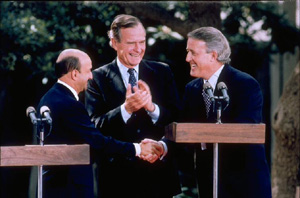DominionSections
Browse Articles
- IndependentMedia.ca
- MostlyWater.org
- Seven Oaks
- BASICS Newsletter
- Siafu
- Briarpatch Magazine
- The Leveller
- Groundwire
- Redwire Magazine
- Canadian Dimension
- CKDU News Collective
- Common Ground
- Shunpiking Magazine
- The Real News
- Our Times
- À babord !
- Blackfly Magazine
- Guerilla News Network
- The Other Side
- The Sunday Independent
- Vive le Canada
- Elements
- ACTivist Magazine
- The Tyee
- TML Daily
- New Socialist
- Relay (Socialist Project)
- Socialist Worker
- Socialist Action
- Rabble.ca
- Straight Goods
- Alternatives Journal
- This Magazine
- Dialogue Magazine
- Orato
- Rebel Youth
- NB Media Co-op
Radio
Canadian News: January
January 13, 2004
Canadian News: January
Revenues Up, Workforce Down: CCPA Issues NAFTA Report Card

North American leaders Bush, Mulroney, and Salinas initiating NAFTA in San Antonion in 1992.
The report compares what the Canadian Council of Chief Executives (CCCE – formerly BCNI) claims as its successes over the past fifteen years under the Free Trade Agreement to how these successes have affected the Canadian workforce and general population.
The report tracked 39 of the CCCE's member companies and found that overall, the companies experienced a 105 per cent increase in revenue between 1988 and 2002, equating to $144 billion in profits. In the same time period, however, the same 39 companies eliminated over 100,000 jobs (a decrease of 14.5 per cent).
Government social spending was also examined by the report. It points out that even though the initial proponents of the Free Trade Agreement claimed that social spending would be increased thanks to the deal, the net result was that money spent on social programs decreased from 13 per cent to 10.5% per cent of the GDP between 1998 and 2002. (Vive Le Canada)
* * *
Pension Plan Investments Violating Global Mine Ban Treaty?
A portion of every dollar that employed Canadians must by law contribute to the Canadian Pension Plan (CPP) is invested in 15 of the world's top 20 weapons contractors (and about 170 military corporations in total), claims a recent report authored by the Coalition to Oppose Arms Trade (COAT).
Three companies - Lockheed Martin, Raytheon, and GE - that the CPP invests in are involved in making anti-personnel landmines. COAT coordinator Richard Sanders points out that Canada has been a leader in the Nobel Peace Prize-winning International Campaign to Ban Landmines (ICBL) coalition that has been ratified by 141 countries. Sanders says the investments should be seen as a violation of the ICBL.
John Cappelletti, a manager of the CPP Investment Board, says that CPP investment decisions are based solely on financial aspects, and that legislation prevents ethics or morals from being considered during the investment process. (Ottawa Indymedia)
* * *
Plan to Convert Adams Mine to Landfill Draws Opposition
A plan to allow the draining of the Adams mine near Kirkland Lake, Ontario, so that it can be turned into a dump has resulted in thousands of opposition emails and letters sent to the Ontario Environment Ministry.
Terry Graves of Public Concern Temiskaming warns that there will be dissent and action taken if the plan goes ahead, and that there have already been rumours of highways and railways potentially being blocked.
The Adams mine, which has since developed into a lake in its disuse, is wanted by some to be an alternative location for Toronto's garbage, and this is the third time that the mine has been targeted as a landfill option. The garbage is currently being sent to a landfill site in Michigan.
A certificate of approval has been granted for the plan, but Public Concern Temiskaming believes that the certificate was premature and scientifically unsupported. (Canoe, Temiskaming Speaker)
* * *
Missile Defence System Decision Upcoming
Federal Defence Minister David Pratt says that a decision will be made soon as to whether Canada will be a participant in the US's Alaska/California/Greenland missile shield that is expected to be operational in the fall of 2004.
Canada and the US have been discussing Canada's potential involvement since May of 2003, and George Bush and Paul Martin will continue the discussion when they meet in Mexico at the Summit of the Americas in mid-January.
NDP leader Jack Layton calls the system a "profoundly dangerous idea" and does not have any faith in Pratt's claim that the program will not cost Canada any land or money. Layton is concerned that the plan will be expensive, will not work, and will jeopardize global arms control efforts.
Martin has indicated that the plan could be beneficial to Canada, claiming that the country should have some influence on how the missile defence system is used. Pratt and Martin have each said that they expect parliamentary debate on the issue, but Martin would not say whether the proposal would be put to a vote. (CP Jan 8 2004)
Related articles:
By the same author:
Archived Site
The Dominion is a monthly paper published by an incipient network of independent journalists in Canada. It aims to provide accurate, critical coverage that is accountable to its readers and the subjects it tackles. Taking its name from Canada's official status as both a colony and a colonial force, the Dominion examines politics, culture and daily life with a view to understanding the exercise of power.